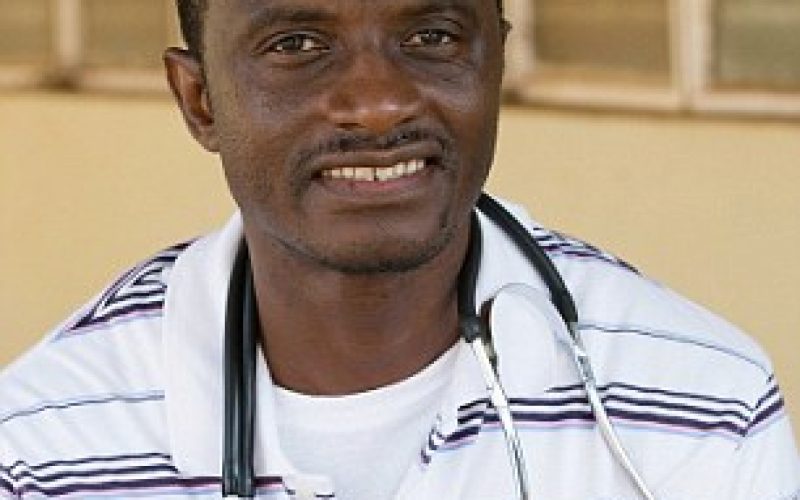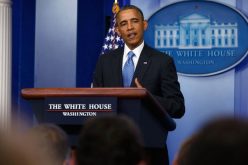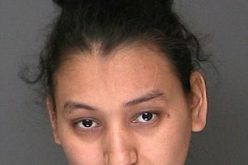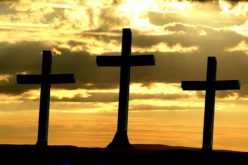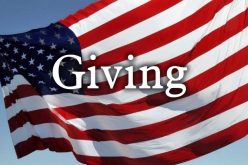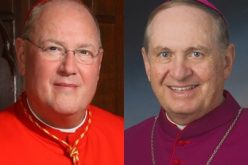Dr Martin Salia, 44, has died after receiving treatment for Ebola at the University of Nebraska Medical Center in Omaha
- He arrived in the country Saturday from Sierra Leone in West Africa
- Surgeon was a permanent resident of the U.S. and lived in Maryland with his wife and sons when he wasn’t working in his native Sierra Leone
- Initially tested negative for the virus on November 6, and continued to suffer symptoms for five days until he took another test, which turned up positive
- By the time he was transported to the U.S., Dr Salia was in extremely critical condition in advanced stages of the disease
- Three people who hugged Dr Salia after his false negative Ebola test are currently in quarantine over fears they may have been exposed to the virus
Daily Mail – The surgeon who was flown back to the United States this weekend after contracting Ebola working in Sierra Leone has died, the University of Nebraska Medical Center announced.
Dr Martin Salia was diagnosed with the deadly virus on November 10 and arrived in Omaha for care on Saturday, where doctors described the 44-year-old as ‘extremely ill’ and in perhaps worse condition than any other Ebola patient treated in the U.S.
By Sunday the Sierra Leone native’s condition had deteriorated to extremely critical. He died early Monday morning, around 4am.
‘It is with an extremely heavy heart that we share this news,’ said Dr Phil Smith, medical director of the Biocontainment Unit at Nebraska Medical Center, said in a statement Monday morning. ‘Dr Salia was extremely critical when he arrived here, and unfortunately, despite our best efforts, we weren’t able to save him.’
Dr Salia had advanced symptoms of the virus when he arrived, doctors said, including kidney and respiratory failure. They desperately tried to save him by placing him on dialysis, a ventilator and giving him several medications to support his organs.
He also received a blood transfusion from an Ebola survivor and a dose of the experimental serum ZMapp.
‘We used every possible treatment available to give Dr Salia every possible opportunity for survival,’ said Dr Smith. ‘As we have learned, early treatment with these patients is essential. In Dr Salia’s case, his disease was already extremely advanced by the time he came here for treatment.’
Dr Salia was born in Sierra Leone but was a permanent resident of the United States and lived in New Carrollton, Maryland with his wife and children. He would spend about four months at a time working overseas.
The U.S. State Department helped facilitate the transfer of Dr Salia. The U.S. Embassy in Freetown said his wife planned to reimburse them for the cost of the private medevac flight, which has not yet been calculated. The travel costs and care of other Ebola patients flown to the U.S. have been covered by the groups they worked for in West Africa.
Ebola has killed more than 5,000 people in West Africa this year, mostly in Liberia, Guinea and Sierra Leona. Of the 10 people treated for the virus in the U.S., all but one has recovered.
Dr Salia’s death is even more tragic considering he went nearly a week, believing he was Ebola-free.
The doctor started showing symptoms of the virus on November 6, but his initial test came up negative. However, CDC officials say some doctors are unaware that Ebola tests can be inconclusive in the first three days the virus is in the system.
Now the three people who hugged Dr Salia after hearing news of the negative test result are in quarantine, over fears they may have been infected. So far none are symptomatic.
‘We were celebrating. If the test says you are Ebola-free, we assume you are Ebola-free,’ said Komba Songu M’Briwa, who cared for Salia at the Hastings Ebola Treatment Center in Freetown, told the Washington Post. ‘Then everything fell apart.’
After receiving his Ebola test results, Dr Salia was released from the Ebola treatment ward but remained feverish and weak. For the next five days, his symptoms worsened to the point he started vomiting uncontrollably and suffered a high fever and diarrhea. He was prescribed malaria medication but his condition did not improve.
Eventually he called colleague Alhali Osman at the hospital where they both worked, expressing fears that he might still have Ebola ‘in spite of what the test said’. On November 10, Dr Salia took another test and this time he tested positive.
It’s still unclear how Dr Salia contracted the virus, since his hospital did not treat Ebola patients. Doctors there say they work with the understanding that any of their patients could be infected, which leaves them at high-risk of catching the disease since they normally only wear gloves as protection.
Since the star of this year’s outbreak, 320 health care workers in Sierra Leone have died of the disease. The faces of some doctors have been plastered on billboards across Freetown with he words ‘some of our national heroes killed by Ebola’.
Dr Salia’s wife, Isatu Salia, said in a telephone interview this weekend that when she spoke to her husband early Friday and that his voice sounded weak and shaky. The couple had two children together, ages 12 and 20.
‘We’re very grateful for the efforts of the team led by Dr. Smith,’ Mrs Salia said Monday. ‘In the short time we spent [at Nebraska Medical Center], it was apparent how caring and compassionate everyone was. We are so appreciative of the opportunity for my husband to be treated here and believe he was in the best place possible.’
Sierra Leone is one of the three West African nations hit hardest by the Ebola epidemic this year – the largest in history. Five other doctors in Sierra Leone have contracted Ebola, and all have died.
Dr Salia was the third Ebola patient to be treated by the UNMC, one of a handful of medical facilities in the United States specially designated to treat Ebola patients.
Both of the previous patients, Dr Rick Sacra and NBC cameraman Ashoka Mukpo, survived.
Following Dr Salia’s death, hospital officials held a press conference to detail the methods they used in trying to save the surgeon’s life.
University of Nebraska Medical Center Chancellor Jeffrey P Gold, said health care workers at the center ‘performed a truly heroic effort’ and ‘gave it their all’ during Dr Salia’s 36 hours of care in the U.S.
Dr Gold also thanked the nation for the ‘remarkable’ outpouring of grief and support following Dr Salia’s unfortunate death.
‘We used the maximum amount of supportive care and every advanced technique in order to save his life,’ Dr Gold said. ‘We are very, very sorry the outcome is not the one we all wished for.’
Dr Gold went on to say that Dr Salia’s death should be a lesson of how serious the Ebola epidemic is, and how after a certain point there is little health care workers can do to save a patient.
There are currently no other cases of Ebola in the United States, where nine other people have been treated for the killer virus.
Dr Salia was the tenth. Only one other – Liberian-born Thomas Eric Duncan – has died from the disease on U.S. soil.
Despite some hopeful signs – Liberia has lifted its state of emergency and the Democratic Republic of the Congo announced the end of its own, unrelated, outbreak of Ebola – the recent deaths of three people in Mali have fueled fears of a new African hot spot.
There is no known cure for Ebola, one of the deadliest known pathogens, but trials for several possible treatments were announced this week in West Africa and Canada.
The disease is spread through contact with bodily fluids.
Dr Salia received his surgical training from a group called the Pan African Academy of Christian Surgeons, which seeks to train African doctors on a level comparable to training they would receive in the U.S., said Richard Toupin, of Auburn, Indiana, a fellow medical missionary.
‘He is one of the best-trained surgeons in his country,’ Toupin said. ‘He is a very competent surgeon.’
Bruce Steffes, executive director of PAACS, said Salia graduated from the surgical training program in 2008. The training includes a requirement to practice in Africa for four years after completion.
As a result, Steffes said, Dr Salia was free to practice anywhere he wanted, but elected to stay in Sierra Leone, where the need for surgeons is immense.
‘People like Martin are just absolutely dedicated, highly trained… and doing their best in absolutely horrifying conditions,’ Steffes said.
In an interview last April, with United Methodist Communications, Dr Salia spoke about his passion for health care.
‘I knew it wasn’t going to be rosy, but why did I decide to choose this job? I firmly believe God wanted me to do it. And I knew deep within myself. There was just something inside of me that the people of this part of Freetown needed help,’ he said.
‘I see it as God’s own desired framework for me,’ Dr Salia added. ‘I took this job not because I want to, but I firmly believe that it was a calling and that God wanted me to. That’s why I strongly believe that God will have brought me here, will fix whatever comes to my door, (my) way. And I’m pretty sure, I’m confident that I just need to lean on him, trust him, for whatever comes in, because he sent me here. And that’s my passion.’

